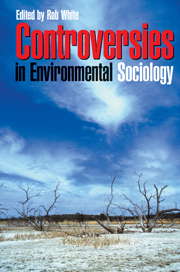Book contents
- Frontmatter
- Contents
- Tables and Figures
- Author Notes
- Abbreviations
- Introduction: Sociology, Society and the Environment
- PART I SOCIAL PERSPECTIVES
- 1 Old Traditions and New Ages: Religions and Environments
- 2 Social Nature
- 3 Gender, Eco-Feminism and the Environment
- 4 Animals, ‘Nature’ and Human Interests
- 5 Governing Environmental Harms in a Risk Society
- PART II SOCIAL TRENDS
- PART III SOCIAL ISSUES
- Index
- References
1 - Old Traditions and New Ages: Religions and Environments
Published online by Cambridge University Press: 05 June 2012
- Frontmatter
- Contents
- Tables and Figures
- Author Notes
- Abbreviations
- Introduction: Sociology, Society and the Environment
- PART I SOCIAL PERSPECTIVES
- 1 Old Traditions and New Ages: Religions and Environments
- 2 Social Nature
- 3 Gender, Eco-Feminism and the Environment
- 4 Animals, ‘Nature’ and Human Interests
- 5 Governing Environmental Harms in a Risk Society
- PART II SOCIAL TRENDS
- PART III SOCIAL ISSUES
- Index
- References
Summary
Surely religion has little to say of significance about the environment? That is a central argument of this chapter. However, it is only half the story, and the opening sentence may not have quite the meaning that you think. It is the Christian tradition and its secularised descendant ‘consumerist capitalism’ that are the religious traditions that have typically devalued the natural world by ignoring it. This world is of little significance if salvation is primarily in the next world and the key encounter in this world is between an individual's soul and a transcendent deity seen as Other. Similarly, in consumerist capitalism, talk of the rights of trees, fish, or mountains seems strange when human pleasure and wealth are the criteria by which all actions are judged. I argue that at the heart of the current environmental crisis is the relegation of the environment to something of peripheral significance. This relegation derives from the religious traditions of Christianity and consumer capitalism.
Other religious traditions, such as indigenous traditions, Buddhism, and contemporary Paganism, have very different approaches to the natural world. Typically, these traditions regard this earth as important, and do not consider human pleasure and wealth to be adequate justifications for large-scale environmental destruction. The effects of these religious traditions is clearest in their outcomes: they have fostered human societies that live in a largely ecologically sustainable relationship with the forests, rivers, and animals around them.
- Type
- Chapter
- Information
- Controversies in Environmental Sociology , pp. 8 - 25Publisher: Cambridge University PressPrint publication year: 2004
References
- 2
- Cited by



